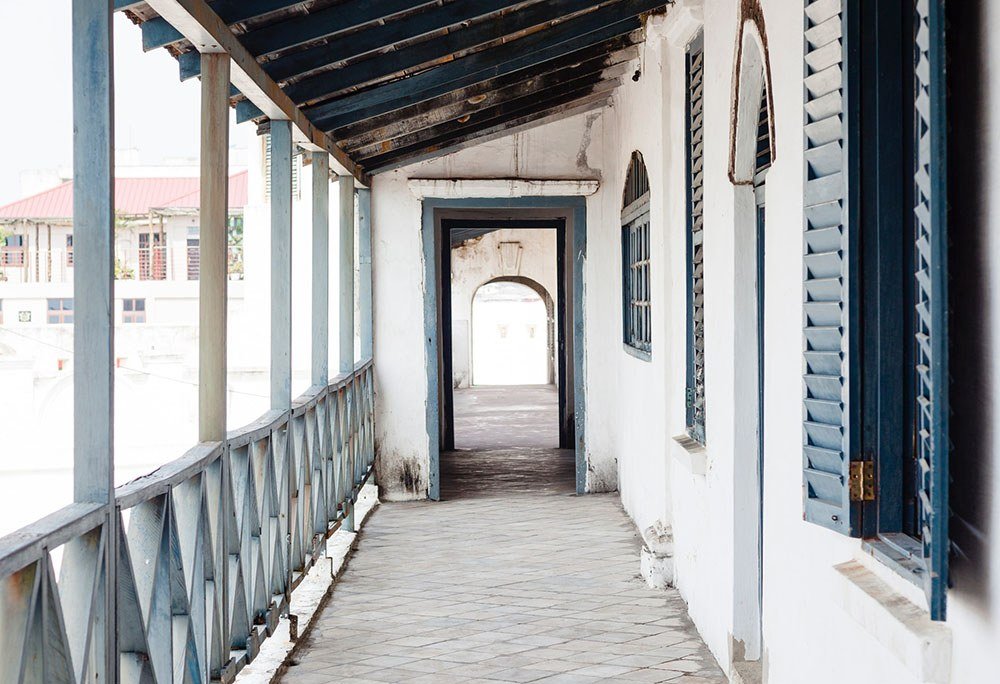Human Rights Day: the perspective from Ghana
Cape Coast Castle, Ghana | Credit: Badal Patel
To commemorate Human Rights Day, PEN International and PEN Centres are launching an essay series and holding events on human rights issues across the globe.
The aftermath of the decriminalisation of libel laws in Ghana: the state of freedom of expression and journalistic practice
Introduction
Ghana’s criminal libel and seditious laws (commonly referred to as the Criminal Defamation Laws) formed part of the Criminal Code (the 1892 Criminal Code Ordinance, which was amended in 1934) bequeathed to the country at independence. Added to that was the Newspaper Registration Ordinance which came to effect in 1894. Both laws stifled free speech and freedom of expression. Following a series of protests and agitations from media practitioners and several institutions, the criminal libel laws were repealed on 26 July 2001.
Aftermath of the Repeal
The repeal of the criminal libel laws in 2001 has expanded the frontiers of freedom of expression and media freedoms, thus strengthening the provisions of the 1992 Constitution. Free speech started to become a reality for both media practitioners as well as ordinary citizens, as people were now able to express themselves in different forms through the platforms provided by media organisations, especially the numerous local language radio and television stations.
However, since the repeal of these laws there has been a heightened concern by media practitioners, writers and the general public about a gradual erosion of trust in the media. Some journalists and media organisations have been considered unprofessional and unethical, and are seen to have misinterpreted the repeal of the criminal libel laws as open licence to publish unsubstantiated allegations against individuals, especially political appointees and top business executives, and openly defame people.
This situation has compelled those who feel libelled or defamed to seek redress and protection in the courts, leading to the dragging of some journalists and media outlets before the court where heavy fines have been imposed on them. The number of civil defamation cases against journalists and media organisations has been on the rise since the repeal of the laws.
By March 2006, 90 per cent of all libel cases that went before the Fast Track High Court involved journalists and media organisations. On 31 July 2013, an Accra High Court fined the state-owned newspaper Daily Graphic and a private newspaper The Democrat, a total of Gh¢180,000 (about $86,282) for libelling former member of parliament and minister of trade, Joe Baidoe-Ansah. In March 2014, Daily Guide and The Informer newspapers were given heavy fines of Gh¢250,000 and Gh¢300,000 respectively for publishing libellous stories about the General Secretary of the National Democratic Congress, Johnson Asiedu-Nketiah. More recently, in September 2019, a journalist from the TV3 network, Natalie Fort, sued seven news portals for defamation.
Equally of concern is the practice whereby some journalists and media outlets have allowed themselves to be used as propaganda tools for political parties and politicians, thus sacrificing objectivity, accountability and professionalism. Some have also faced contempt of court charges due to their unguarded pronouncements on air and biased stories in newspapers.
In 2013, Ken Kuranchie, editor of the Daily Searchlight newspaper and a member of the New Patriotic Party (NPP) and Stephen Atubiga, a member of the National Democratic Congress’ (NDC) Communication Team, were cited for contempt by the Supreme Court for "scandalising the court after publicly criticising and bringing into disrepute the Supreme Court Judges and their decisions”, in relation to their comments on the radio at the time when a petition was before the Supreme Court for a decision to determine the winner of the 2012 presidential election. They were jailed 10 days and three days respectively.
In the same year, the General Secretary of the NPP, Kwadwo Owusu Afriyie and Hopeson Adorye, a member of the party’s Communication Team, were fined GH¢5,000 and GH¢2,000 respectively by the Supreme Court for contempt for their comments on radio about the court. Again, in 2016, a host of Montie FM’s political radio programme, infamous for its broadcasting of hate and diatribe, and two panellists, were cited for contempt of the Supreme Court and jailed.
As PEN Ghana, along with PEN International and other PEN Centres, noted in its 2017 report, “Stifling Dissent, Impeding Accountability: Criminal Defamation Laws in Africa”, the failure, particularly of radio broadcasters, to adhere to basic professional and ethical standards stems primarily from inadequate training of journalists and a failure of appropriate broadcast regulation rather than the removal of criminal penalties for defamation.
It is therefore paramount for the media to undertake self-introspection, exercise self-control and uphold professional and ethical practices, especially at a time when parliamentary and presidential elections are to be held in December 2020. Extensive and intensive training programmes for journalists, writers and media organisations should be conducted to highlight the significance of their professional ethics in ensuring that the repeal of the criminal libel laws becomes meaningful for journalists, writers and society at large.
Dr Frankie Asare-Donkoh lectures in at Pentecost University, Accra, Ghana. He holds a PhD and MA from Cardiff University and a Diploma in Journalism from the Ghana Institute of Journalism. He was a former acting General Secretary (2000) and Deputy General Secretary (1996-1999) of the Ghana Journalists Association.
Frankie was Secretary for the Ghanaian PEN Centre until 2012 when he became the Centre President. He also served as the Secretary-General of the PEN Africa Network (PAN) from 2013.

